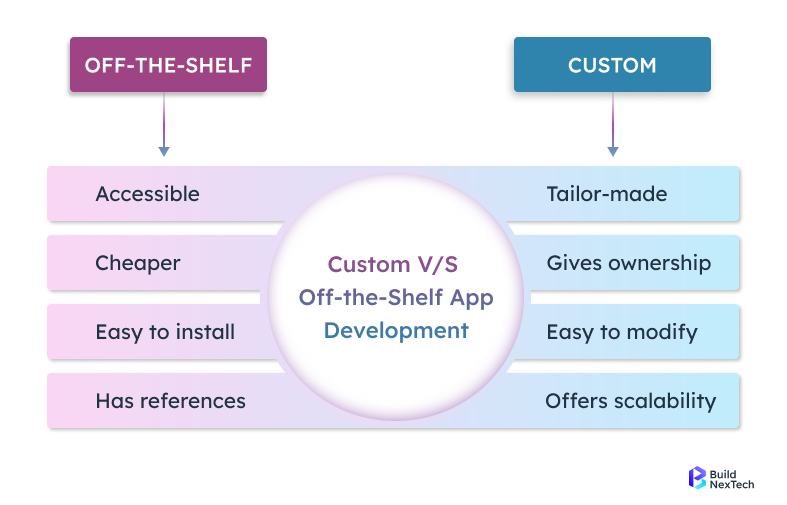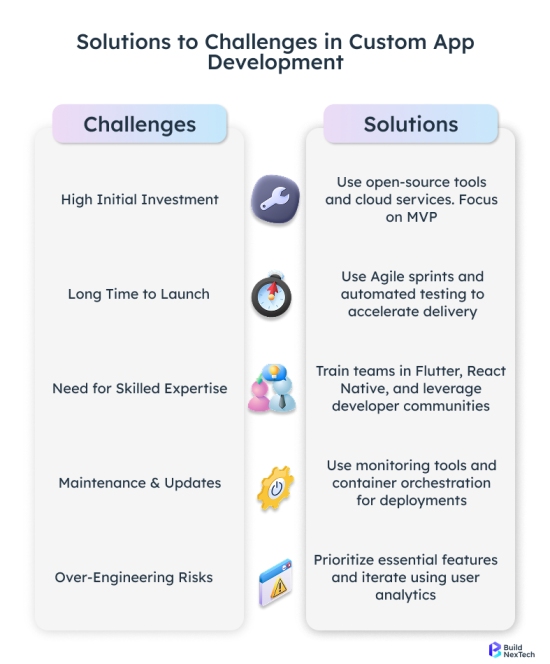Custom app development enables businesses to create applications that precisely match their processes and customer needs. This is different from off-the-shelf software. It improves user experience design. It also connects with enterprise software development. It provides stronger data security. Organizations can utilize technologies such as Flutter app, Swift code language, Objective-C, Java Spring, and Python. These technologies help them build applications that can grow, change, and bring new ideas.
The global mobile app market size is expected to grow from USD 277.02 billion in 2024 to USD 313.88 billion in 2025. It will grow further to USD 528.79 billion by 2029 at a CAGR of 13.3%. The rising demand shows why custom mobile app development services help businesses get a higher return on investment. Cross-platform app development and optimized mobile app design also reduce mobile app development costs in the long run.
💡 What is covered in this Blog?
📌 What custom app development is and how it differs from off-the-shelf software.
📌 Key benefits of custom apps for business growth, including better user experience, optimized operations, and increased efficiency.
📌 Why custom apps matter for modern businesses, supporting innovation, faster decisions, and adaptability.
📌 Comparison of custom apps vs off-the-shelf solutions in terms of features, flexibility, technology stack, and time-to-market.
📌 Real-world examples and success stories from companies like Nike, Spotify, and Uber demonstrating effective custom app implementation.
Introduction to Custom App Development
Custom app development means designing and building applications for a specific business. It does not rely on pre-made or off-the-shelf software. This approach ensures that apps align with business goals, customer needs, and internal workflows. Custom applications work better when providing software development services. They also improve user experience design and offer stronger data security compared to generic tools.
Why It Matters for Modern Businesses
Generic software and ready-made solutions often fall short of meeting modern business needs. Companies must develop custom mobile apps and custom web apps tailored to their unique business requirements. Working with an experienced development partner helps. These partners make sure applications give clear results. They improve customer experience. They also support long-term business growth.
Key ways custom apps make a real difference:
- Driving Innovation: Custom apps allow companies to introduce unique features, explore new business models, and differentiate themselves in competitive markets.
- Accelerating Decision-Making: By integrating real-time analytics and reporting tools, businesses can make faster, data-driven decisions that improve responsiveness and strategy.
- Supporting Market Adaptability: Applications can quickly adapt to changing trends, regulations, or customer preferences, enabling businesses to stay agile.
- Strengthening Brand Reputation: Tailored digital experiences build trust with customers and enhance brand perception, giving businesses an edge over competitors.
- Enabling Strategic Growth: Beyond operational improvements, custom apps open avenues for expansion, new revenue streams, and long-term digital transformation.
Custom App Development vs Off-the-Shelf Applications
Businesses must choose the right software solution. This choice is important to help them work efficiently, stay secure, and grow easily. Custom app development and off-the-shelf applications serve different purposes and offer distinct benefits. Custom solutions are developed to meet the unique requirements of a business, while off-the-shelf software provides standard features that serve a broader audience. Understanding the key differences helps organizations make informed decisions that align with their goals and growth strategies.

Top Benefits of Custom App Development for Businesses
Custom app development has become a crucial strategy for modern businesses aiming to stay competitive. Unlike ready-made or off-the-shelf software, a custom approach allows companies to develop an app that aligns perfectly with their unique workflows, processes, and customer needs. Businesses can create digital solutions from mobile app design to website and app development. These solutions improve user experience. They make operations simpler. They also provide clear results.
1. Tailored to Specific Business Needs
Custom applications, whether mobile or web-based, are built to meet the specific requirements of an organization. Generic software forces businesses to adapt to standard features. Custom apps provide solutions designed around your exact workflows, CRM systems, and customer interaction strategies.
Key advantages include:
- Alignment with unique business objectives and operational needs.
- Applications are scoped to reduce performance issues and maximise efficiency.
- Interactive features and personalized recommendations that improve customer engagement.
Custom solutions combine enterprise software development tools. This ensures smooth workflows. Custom apps improve productivity. They also increase accuracy in operations.
2. Enhanced Security Measures and Data Protection
One of the main reasons companies choose custom mobile app development services is to ensure enhanced protection of sensitive data. Custom solutions use advanced encryption methods. They have security protocols made for specific needs. They provide strong data security. This is different from off-the-shelf apps. Companies with sensitive information can lower risks. They should select a developer who prioritizes security during the design phase.
OAuth2 Resource Server - Access Token Verification (Express)
// npm install express jose
const express = require('express');
const { jwtVerify } = require('jose'); // for JWT signature validation
const jwksUri = 'https://issuer.example/.well-known/jwks.json';
async function getKey(kid) {
// fetch and cache JWKS; simplified example omitted -- use a JWKS client lib
}
async function verifyJwt(token) {
// decode header to get kid, fetch correct JWK, convert to KeyLike, and call jwtVerify()
return await jwtVerify(token, /* KeyLike */);
}
const app = express();
app.use(async (req, res, next) => {
try {
const auth = req.headers.authorization || '';
const token = auth.split(' ')[1];
if (!token) return res.sendStatus(401);
await verifyJwt(token);
next();
} catch (e) { res.sendStatus(401);
}
});
Benefits include:
- Strong protection for sensitive user data
- Security protocols designed to comply with industry regulations
- Continuous updates and monitoring by a dedicated development team
With frameworks like Java Spring or Python, developers can build secure, reliable applications that protect both company and customer information.
3. Better Customer Experience and User Satisfaction
A seamless UI/UX design is vital for modern applications. Businesses can invest in custom app development. They can create interfaces that match user behavior. They can provide interactive elements. They can deliver personalized content. Integrating analytics tools into the application enables businesses to track user patterns and improve engagement.
How it improves customer experience:
- Smooth navigation and consistent UI across devices
- Personalized recommendations based on real-time user behavior
- Faster customer support and problem resolution through app features
Custom apps ensure that user experience design is tailored to target audiences, increasing satisfaction, loyalty, and overall brand value.
4. Flexibility, Scalability, and Cost Savings
While off-the-shelf software often lacks flexibility, custom applications are built to scale alongside your business. Companies can add new features. They can also integrate IoT solutions. They can expand storage and functionality in cloud-based environments. These changes do not affect performance.
Custom mobile app development may cost more at first. But custom apps save money over time. They remove the need for extra licensing fees. They also avoid the limits of generic software.
Practical advantages include:
- Ability to scale and adapt as the business grows
- Developing apps across multiple platforms eliminates the requirement for separate codebases.
- Leveraging low-code platforms and cloud infrastructure allows quicker updates and easier maintenance.
This flexibility ensures that businesses remain agile and prepared for evolving market demands.
5. Stronger Integration Capabilities
Custom software connects easily with existing systems. These include CRM platforms, analytics tools, and other enterprise software frameworks. You can build apps using drag-and-drop software. You can also connect third-party services. Custom apps work smoothly. They do not disrupt the user experience.
Third-Party Service Integration (Payments - Spring Boot & Stripe)
@RestController
@RequestMapping("/api/payment")
public class PaymentController {
@PostMapping("/create-intent")
public String createPaymentIntent(@RequestParam long amount) throws Exception {
Stripe.apiKey = System.getenv("STRIPE_SECRET_KEY");
PaymentIntentCreateParams params =
PaymentIntentCreateParams.builder()
.setAmount(amount)
.setCurrency("usd")
.build();
PaymentIntent intent = PaymentIntent.create(params);
return intent.getClientSecret();
}
}Integration has many benefits:
- Optimized performance with existing IT infrastructure
- Enhanced customer interactions through synchronized CRM systems
- Reduced downtime and minimized compatibility issues
Developers use technologies like Flutter, Swift, Objective-C, Spring Boot (Java), and Python. These tools help apps work on different platforms and have strong features.
6. Improved Return on Investment (ROI)
Investing in an enterprise mobile app development service may seem expensive initially, but it yields higher long-term ROI. Custom apps improve customer retention. They also improve operational efficiency and satisfaction. They do this through tailored features and real-time insights.
ROI benefits include:
- Personalized customer engagement is driving higher conversions
- Stronger security, minimizing financial risks
- Analytics-driven insights for better decision-making
Features like push notifications, analytics dashboards, and support systems help companies grow. They increase revenue and create a lasting competitive edge.
Challenges and Drawbacks of Custom App Development
Custom app development plays a vital role in helping businesses meet unique requirements through tailored solutions. However, along with its advantages, organizations must be aware of the challenges involved to make informed decisions. Choosing the right custom mobile app development company or enterprise software development service partner is essential to navigate these obstacles efficiently.

- Higher Initial Investment
Custom app development often requires a greater upfront investment compared to off-the-shelf solutions. The need for specialized tools, technologies like Java Spring, Python, Swift code language, or Objective-C, and experienced developers can raise the mobile app development cost, especially for startups or businesses with limited budgets. - Extended Time to Launch
Developing a custom solution involves a detailed planning process, coding, testing, and revisions. This can delay the market launch compared to ready-made options. Businesses aiming for quick deployment must align their expectations with the longer timelines involved. - Requirement of Skilled Expertise
Building secure, efficient, and scalable applications demands expertise in cross platform app development, app building software, and Flutter app or FlutterFlow. Without the right team, quality and performance may suffer, affecting user experience and functionality. - Maintenance and Upgrades
After launch, custom apps require continuous maintenance, updates, and feature enhancements to stay aligned with evolving market demands. Investing in regular maintenance is crucial to ensure data security and system reliability. - Possibility of Over-Engineering
There is a risk of developing more features than necessary, which can complicate the app, increase costs, and reduce usability. It’s important to balance innovation with simplicity to optimize return on investment and ensure smooth mobile app design.
Real-World Examples of Custom App Development
Custom app development allows businesses to design solutions tailored to their unique needs, improving user engagement, operational efficiency, and scalability. Below are three notable examples from different industries that showcase the power of custom apps.
1. Nike (Fitness & E-commerce)
Nike’s custom apps, like Nike Training Club, deliver personalized workout plans, curated content, and in-app shopping integrations to improve engagement and customer experience.
Tech Stack & Techniques Used:
- Key Capabilities: Personalization of content and workouts; seamless in-app commerce; workout tracking and gamification
- Techniques: Use of data analytics and machine learning for personalization; UI/UX design focused on ease of use; integration of user progress tracking and content recommendations.
2. Spotify (Music Streaming)
Spotify’s custom app delivers curated playlists, social features, and real-time analytics, creating a highly personalized music streaming experience supported by scalable infrastructure.
Tech Stack & Techniques Used:
- Key Capabilities: Personalized playlists and recommendations; real-time music streaming; social sharing and collaboration features; scalable multi-platform access.
- Techniques: Microservices architecture for flexibility; real-time data streaming with event processing; machine learning for content personalization; caching and optimization for performance; continuous integration and deployment for rapid updates.
3. Uber (Ride-Hailing & Mobility)
Uber’s tailor-made application links riders and drivers through real-time tracking, streamlined payment processing, and efficient ride scheduling, delivering a dependable mobility experience.
Tech Stack & Techniques Used:
- Technologies: Swift and Objective-C (iOS), Java (Android), Python, Node.js, Go, Cloud infrastructure
- Techniques: Real-time data processing, scalable backend services, interactive UI/UX design, high-throughput messaging
Conclusion: Why Custom App Development is the Future of Business Growth
When choosing the right software solution, businesses often face the decision between custom app development and off-the-shelf applications. Custom apps are designed to align with unique workflows, cater to user requirements, and support long-term organizational objectives, unlike standard software solutions. Companies can improve user experience design with tailored solutions. They can also make operations simpler and keep data more secure. These solutions work well with enterprise software development.
Businesses that invest in custom mobile apps and web development gain flexibility. They can adjust to market changes. They can give personalized experiences and work more efficiently. These solutions not only support better customer engagement but also help organizations scale, explore new revenue streams, and achieve a higher return on investment, all while staying compliant and secure.
At BuildNexTech, we provide enterprise web development services and are one of the leading mobile app development firms offering end-to-end solutions. These services are designed to meet your unique needs. Our expert team is ready to assist in building tailor-made applications for your business. We can also help you move to a safer and more scalable environment using AWS cloud migration experts. We provide advanced solutions made for your business's growth and success.
People Also Ask
What alternative tools can businesses use instead of building custom integrations?
Businesses can use pre-built integration platforms like Zapier, Integromat (Make), or Workato, which allow connecting apps without heavy coding.
How do version control systems like Git benefit custom app development teams?
Git tracks code changes, facilitates collaboration among developers, and helps manage multiple versions, reducing conflicts and improving workflow efficiency.
How is app security handled during custom development?
Security is ensured through encryption, secure authentication, regular vulnerability testing, and adherence to industry standards throughout development.
What performance optimization techniques are commonly used in custom apps?
Techniques include caching, database indexing, code refactoring, load balancing, and minimizing resource-intensive operations to ensure faster and smoother app performance.


























.webp)
.webp)
.webp)

